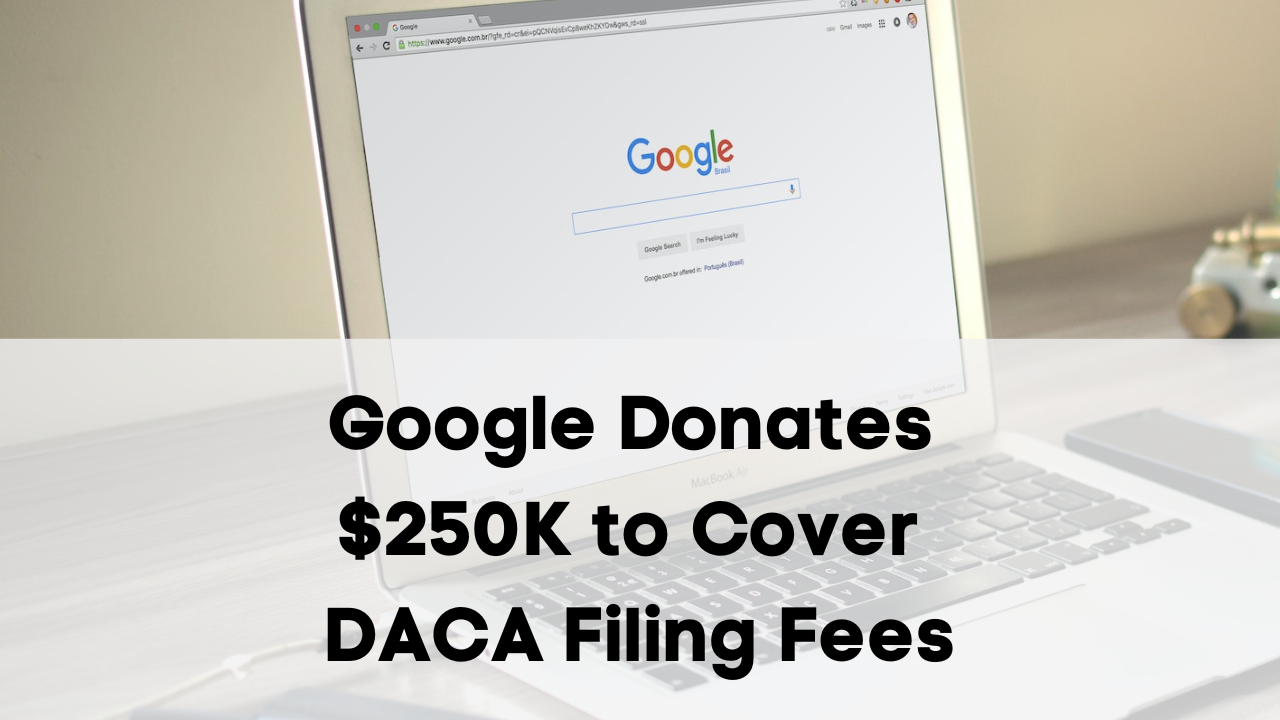Google has pledged to donate $250,000 for Deferred Action for Childhood Arrivals (DACA) applications for over 500 immigrants. This is not the first time the tech giant has shown support for undocumented immigrants, but this donation to United We Dream to support DACA applicants will make a significant impact.
Currently, there is a $495 application fee to complete the DACA application, which can be difficult for undocumented immigrants to cover. Google’s donation will help up to 505 people submit their applications. The $495 total includes the $410 fee for Form I-765 and an $85 biometrics fee.
Submitting an application for this program is a valuable option for many people living in the US. Approved DACA applications mean that immigrants can receive a social security card, driver’s license, and work permit. While DACA comes with many benefits for immigrants, there are also some limits you should be aware of if you’re part of the program. You are allowed to travel abroad as part of this program, but you must get approval prior to leaving the country.
Advance Parole is a process in US immigration law that allows immigrants to leave the US and re-enter lawfully. If you are a recipient of DACA and have an emergent need to travel outside of the US, you may be eligible for emergency advance parole. However, requesting permission ahead of time and completing all the necessary steps to get approval is crucial.
Keep reading to learn more about eligibility and the application process.
Who is Eligible for DACA Advance Parole?
DACA holders can apply for advance parole to travel for three reasons: education, employment, or humanitarian. Urgent humanitarian reasons may include attending a funeral overseas, visiting a sick relative, caring for an immediate relative, and other compelling and emergent situations. Employment reasons include traveling for a work assignment through your US employer or attending a work conference. Educational eligibility for travel includes study abroad programs or academic research overseas.
Receiving emergency advance parole also has an additional benefit beyond being able to travel. Upon re-entering the US with your advance parole document, you will be inspected and admitted into the US by Customs and Border Protection (CBP). This means that you will have a documented and valid entry into the US, which could open the door to adjusting your status to receive a green card and beginning the path to citizenship in some circumstances.
The Application Process For DACA Advance Parole
Applying for emergency advance parole is a fairly straightforward process. Here’s how to do it.
- Request an Infopass appointment with USCIS. You or your attorney will call USCIS and be persistent until you speak to a live human, ideally a Tier-2 supervisor. Once you reach a customer service representative, you will explain your need for emergency travel and will likely be scheduled for a callback later that day (or within 1-2 days) from a T-2 officer. Once you receive your callback, you will need to explain your need for the Infopass appointment. If the officer approves your request, they will schedule the appointment at your local USCIS field office.
- Arrive at your appointment at your specified time.
- Bring all the required documents.
What you will need to complete and bring to your appointment:
- Form I-131, Application for a travel document. (Note: you can file this form in person at your Infopass appointment);
- Supporting evidence of the emergency – bring lots! This may include medical records, doctor’s letter(s), a photograph of your sick relative, the death certificate, etc. Make sure to provide English translations, if applicable;
- Evidence of relationship to person you’re visiting (i.e., birth certificate), if applicable;
- The filing fee of $575;
- Two passport photos; and
- Your passport.
What to Expect?
You will meet with a USCIS adjudicator and review your application at the USCIS field office. They may tell you that they need to check with their supervisor before they can approve your application. That’s okay – you will get a call back pretty quickly (maybe the next day) confirming that the emergency advance parole is going to be issued. You will then need to go back to the field office to pick up your advance parole document. You are then able to travel outside the US as long as you have your approved document and valid passport.
Many DACA recipients have traveled on advance parole without issue, but you should always be very careful that there are not any other reasons that would prevent you from getting back into the US smoothly, like a criminal record or other issues. It’s a big deal to cross the US border at this stage, even with the advance parole, so you must make sure everything is very clear. International travel with DACA should only be considered in true emergencies and urgent situations.
Google is helping to lower the barrier of entry for DACA applicants by covering the fees for hundreds of undocumented immigrants. While there are limits to what the program can provide for and offer to immigrants, it is a valuable option that many people have benefited from. Expanding the number of people who are able to apply will positively impact the lives of each applicant and their families.
Need Assistance with Advance Parole?
At Passage Immigration, we understand that the US immigration system and legal requirements can be confusing and overwhelming. We are here to help you with any of your immigration concerns or questions. If you need to file for advance parole but would like assistance, please visit our website or call us at (503) 427-8243.







